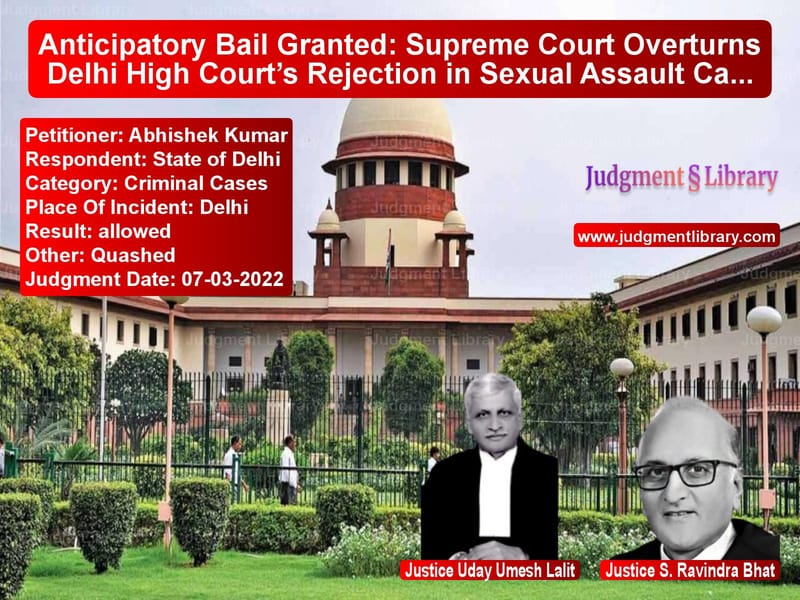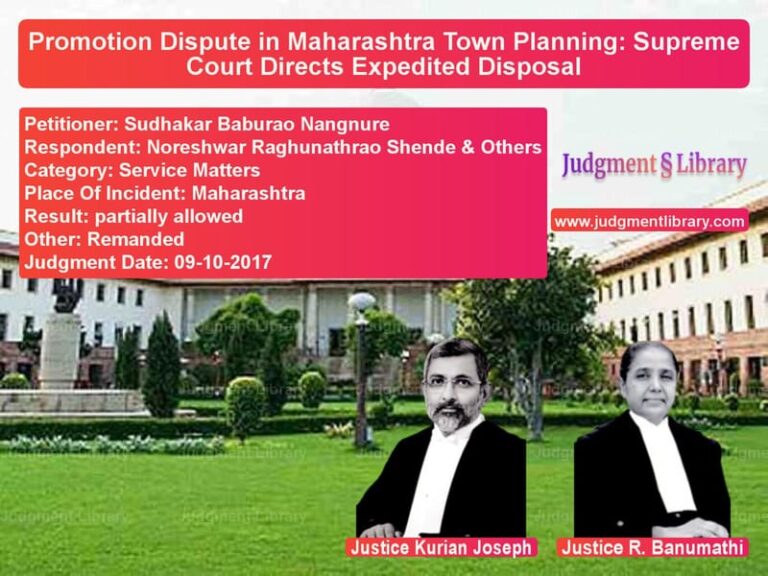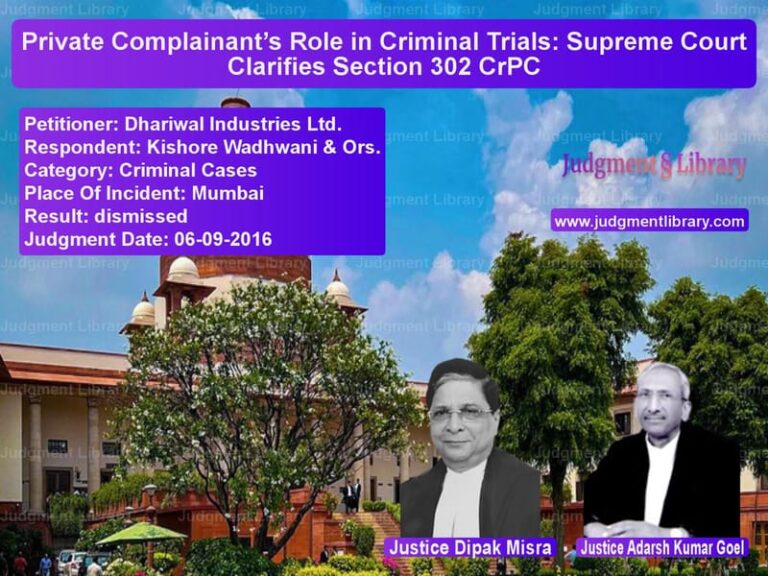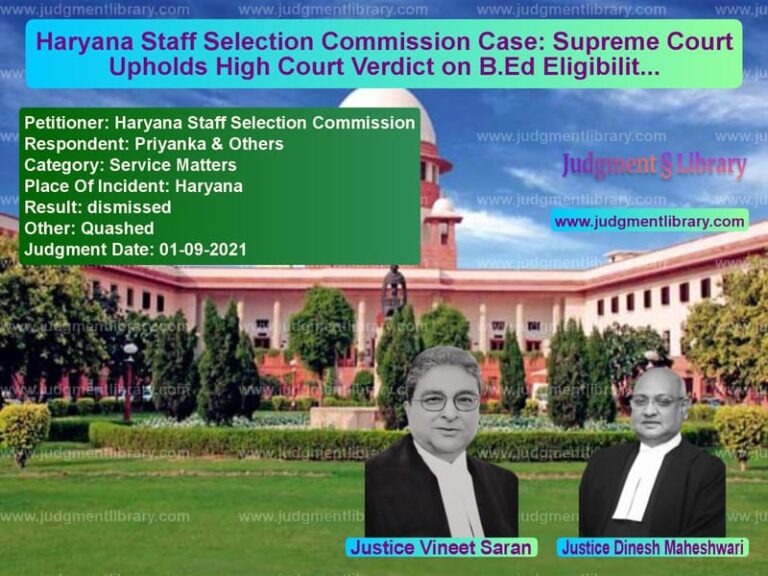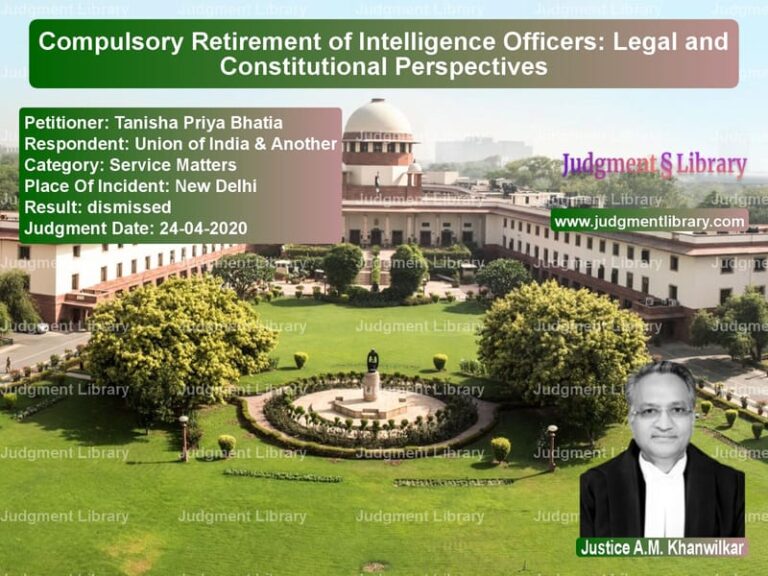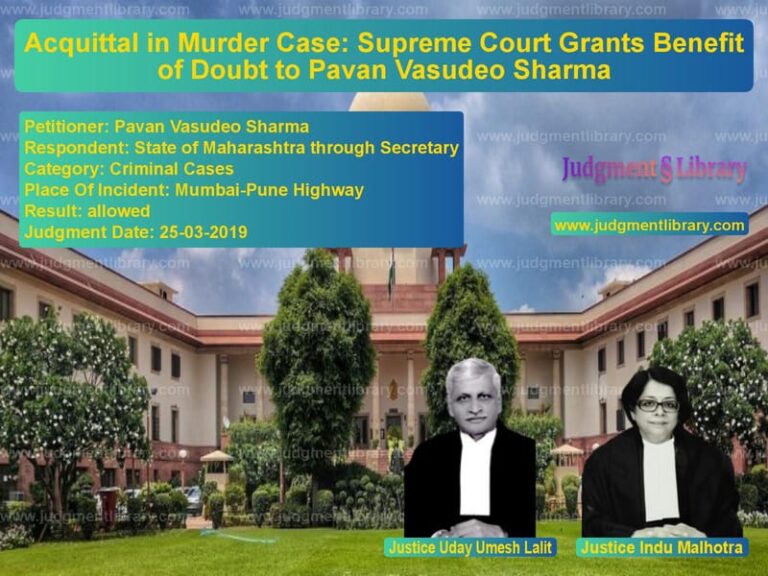Anticipatory Bail Granted: Supreme Court Overturns Delhi High Court’s Rejection in Sexual Assault Case
The Supreme Court recently delivered a crucial judgment in the case of Abhishek Kumar v. State of Delhi, where it overturned the Delhi High Court’s decision to deny anticipatory bail to the accused. The case involved allegations of sexual assault, criminal intimidation, and administering intoxicating substances, leading to an FIR against Abhishek Kumar. This judgment is particularly significant as it reaffirms the principles governing anticipatory bail under Section 438 of the Code of Criminal Procedure, 1973, and the balance courts must strike between personal liberty and investigative needs.
The appellant, Abhishek Kumar, sought anticipatory bail fearing arrest in connection with FIR No. 300/2019, registered at Police Station New Ashok Nagar, East Delhi. The FIR, filed on May 21, 2019, alleged offenses under Sections 376 (rape), 328 (causing hurt by means of poison), 506 (criminal intimidation), and 313 (causing miscarriage without consent) of the Indian Penal Code (IPC). The Delhi High Court rejected his bail plea, prompting him to approach the Supreme Court.
Background of the Case
The complainant alleged that the appellant had established a relationship with her under false pretenses and had administered an intoxicating substance to commit sexual assault. Additionally, the FIR accused Kumar of threatening the complainant and coercing her into undergoing a medical termination of pregnancy against her will. The prosecution maintained that these were grave offenses requiring custodial interrogation.
Petitioner’s Arguments
Abhishek Kumar’s legal counsel presented the following arguments in his defense:
- The allegations were fabricated and driven by ulterior motives.
- The complainant and the appellant were in a consensual relationship.
- The FIR was registered belatedly, indicating an attempt to harass the appellant.
- The appellant had cooperated with the investigation and was willing to do so further.
- Custodial interrogation was unnecessary, as all necessary documentary evidence was already on record.
Respondent’s Arguments
The prosecution, represented by the Additional Solicitor General, argued that:
- The allegations were serious and could not be taken lightly.
- Custodial interrogation was necessary to unearth further evidence.
- Granting anticipatory bail could lead to the accused influencing the investigation.
- The complainant’s medical records and statements corroborated the allegations.
Supreme Court’s Observations
The Supreme Court carefully examined the case and remarked:
“Considering the entirety of the situation, in our view, the appellant is entitled to the relief of anticipatory bail.”
The Court noted that:
- The accused had already been cooperating with the investigation.
- There was no strong justification provided for custodial interrogation.
- The principle of granting bail, unless exceptional circumstances exist, must be upheld.
- Appropriate conditions could be imposed to ensure the appellant’s cooperation.
Supreme Court’s Decision
The Supreme Court allowed the appeal and granted anticipatory bail with the following conditions:
- If arrested, the appellant shall be released on bail upon furnishing cash security of Rs.50,000 along with two like sureties.
- The appellant must cooperate with the investigation and appear before the Investigating Officer whenever summoned.
- The appellant must not attempt to contact or intimidate the complainant.
Legal Implications of the Judgment
This ruling is significant as it underscores the principle that anticipatory bail should not be denied arbitrarily. The Supreme Court emphasized:
- Presumption of Innocence: The accused is presumed innocent until proven guilty.
- Right to Liberty: Courts must ensure that the fundamental rights of the accused are not curtailed unnecessarily.
- Case-Specific Bail Conditions: Imposing conditions can balance investigative needs and personal liberty.
Comparative Analysis with Previous Rulings
The Supreme Court referred to various precedents on anticipatory bail, including:
- Gurbaksh Singh Sibbia v. State of Punjab (1980): Established that anticipatory bail must not be denied merely due to the seriousness of allegations.
- Arnesh Kumar v. State of Bihar (2014): Stressed the need to prevent unnecessary arrests in cases where custodial interrogation is not essential.
- P. Chidambaram v. Directorate of Enforcement (2019): Affirmed that bail should be granted unless the prosecution presents compelling reasons for detention.
Conclusion
The Supreme Court’s decision in Abhishek Kumar v. State of Delhi is a landmark ruling reinforcing the principles governing anticipatory bail. By setting aside the Delhi High Court’s decision, the Supreme Court upheld the importance of protecting individual liberty while ensuring that the law is not misused.
Read also: https://judgmentlibrary.com/supreme-court-overturns-confiscation-of-vehicle-in-cow-slaughter-case/
This judgment will serve as a guiding precedent for future cases where courts must weigh the rights of the accused against the interests of justice.
Petitioner Name: Abhishek Kumar.Respondent Name: State of Delhi.Judgment By: Justice Uday Umesh Lalit, Justice S. Ravindra Bhat.Place Of Incident: Delhi.Judgment Date: 07-03-2022.
Don’t miss out on the full details! Download the complete judgment in PDF format below and gain valuable insights instantly!
Download Judgment: abhishek-kumar-vs-state-of-delhi-supreme-court-of-india-judgment-dated-07-03-2022.pdf
Directly Download Judgment: Directly download this Judgment
See all petitions in Bail and Anticipatory Bail
See all petitions in Fraud and Forgery
See all petitions in Judgment by Uday Umesh Lalit
See all petitions in Judgment by S Ravindra Bhat
See all petitions in allowed
See all petitions in Quashed
See all petitions in supreme court of India judgments March 2022
See all petitions in 2022 judgments
See all posts in Criminal Cases Category
See all allowed petitions in Criminal Cases Category
See all Dismissed petitions in Criminal Cases Category
See all partially allowed petitions in Criminal Cases Category

